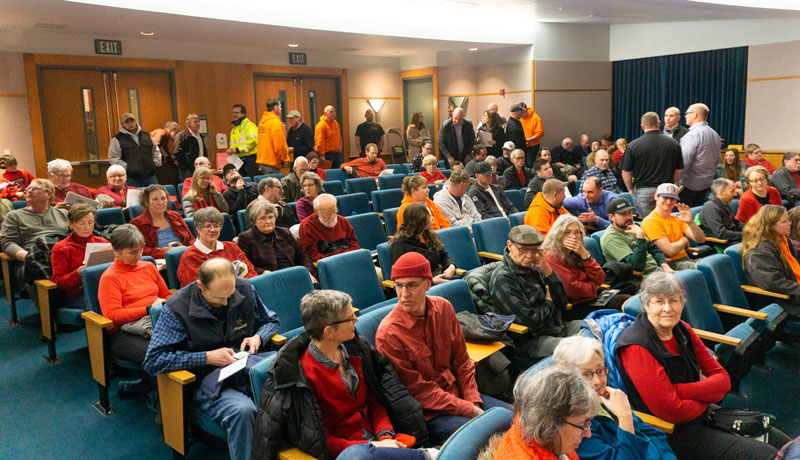
![]() For more than two years now, the small community of Whatcom County, in Northwest Washington State in the U.S. has been working with local leaders to take bold action that would restrict growth of dirty fossil fuel projects in their community — all while safeguarding industry workers, the climate, and the economy. If they get the details right, this policy will be an example of a smart path forward for local governments across the U.S. – and one that could be used by other places in the world where local councils have the power to prevent local damage. This compelling story of rapid transition, told by Alex Ramel from Alliance member Stand.Earth, provides an insight into how a community can come together to fight major fossil fuel companies and protect their local environment.
For more than two years now, the small community of Whatcom County, in Northwest Washington State in the U.S. has been working with local leaders to take bold action that would restrict growth of dirty fossil fuel projects in their community — all while safeguarding industry workers, the climate, and the economy. If they get the details right, this policy will be an example of a smart path forward for local governments across the U.S. – and one that could be used by other places in the world where local councils have the power to prevent local damage. This compelling story of rapid transition, told by Alex Ramel from Alliance member Stand.Earth, provides an insight into how a community can come together to fight major fossil fuel companies and protect their local environment.
Home to 200,000 people, Whatcom County is the most Northwestern county in the mainland United States, this region is also home to one of the last undeveloped deep water ports on the West Coast, which has made it a prime target for fossil fuel interests that want to export their products across the ocean to Asia or down the West Coast. From coal to oil to natural gas, the community has spent the last decade facing one fossil fuel expansion project after another. Taken together, these proposals have a carbon footprint more than double the entire rest of Washington state put together.

With input from local organizations, the Whatcom County Council smartly recognized gaps in existing policies and regulations. In August 2016, a temporary moratorium on new proposals for unrefined fossil fuel transport projects was implemented to reduce development pressures while new rules could be developed. And as of July 2019, this has gone further and a groundbreaking ordinance has been introduced that would permanently safeguard the health of the local community from harm caused by fossil fuel expansion projects while also protecting industry workers, the climate, and the economy. This new ordinance will allow the council to:
An ordinance like this can be mirrored by other local governments. Across the U.S. communities are under siege from fossil fuel expansion proposals and local leaders are increasingly aware that we are in an era of dire climate change threats. These tools can be used to zone out new fossil fuel terminals, storage facilities, refineries, and more. Even if federal or state action is difficult to achieve, local governments can take the lead in saying no to new fossil fuel infrastructure.
This example illustrates a way that individuals can make a difference on climate change and public safety beyond just making personal choices. A lot of people feel hopeless about combating the fossil fuel industry and what they’re doing to their communities and the wider planet. These tools, which are now being advanced and supported by the organization Stand.Earth under the banner of SAFE Cities – standing for Standing Against Fossil Fuel Extraction – are a way for people to take meaningful action in their communities.
In an era where federal protections in the U.S. are being deliberately dismantled, action by local governments using land use and zoning authority are incredibly important. Stand Earth’s toolkit helps others to organize in their own community to pass similar laws.
The Cherry Point industrial area is home to one of the last undeveloped deep water ports on the West Coast, which has made it a prime target for fossil fuel interests that want to export their products across the ocean to Asia or down the West Coast. From coal, to oil, to fracked gas, the community has spent the last decade facing one fossil fuel expansion project after another. Taken together, these proposals have a carbon footprint more than double the entire rest of Washington state put together.

Some fossil fuel projects in the Pacific Northwest have led to dramatic expansion of explosive oil trains leading to several accidents, including a fiery derailment along the Columbia River. Other proposed projects would increase oil tanker traffic, risking spills and disrupting fisheries and endangered orca habitat in the Salish Sea. The possibility of crude oil export has become a major concern for industry workers worried about refineries turning into export facilities while their jobs are sent overseas.
The seven-member Whatcom County Council had been exploring options for permanent land use regulations that would require a more careful review of the fossil fuel industry’s heavy impact on the local environment, even consulting outside legal advice to ensure they get this right. The policy was justified by growing understanding of the serious health impacts, water pollution, threats to the Salish Sea, and damage to the climate caused by fossil fuels. The local community were successful in blocking what would have been the largest coal export terminal in North America, but at the same time oil companies developed oil train terminals with similar risks. Local people knew they needed to change tactics. If they could change the rules so that fossil fuel companies were forced to fully disclose their impacts, perhaps the worst projects could be denied outright?
Working alongside campaigners RE Sources and Stand.earth, the community convinced leaders in the county government to enact a temporary moratorium on unrefined fossil fuel infrastructure in 2016. Whatcom County Council has continued extending the moratorium ever since. And in every public hearing, community members have spoken in favor of the fossil fuel moratorium because they want to protect their family and friends, the Salish Sea, and prevent further climate change. The was for the temporary moratorium to be replaced by a permanent update to the zoning code and policies. As of July 2019, a groundbreaking ordinance has been introduced and is being advanced toward adoption. This groundbreaking ordinance would safeguard the health of the local community from harm caused by fossil fuel expansion projects, while also protecting industry workers, the climate, and the economy.
As a result of this teamwork, a vote by the county council and the stroke of a pen, the local government will be able to change the rules, permanently saying no to new fossil fuel facilities and limiting the impacts of future expansions at the refineries already in the area. Local government leaders are, in many ways, more accountable to the communities that they represent. They live in the community, they have meetings in the community, they listen to constituents, and they read their own email. That means that we can talk to them, and persuade them to do the right thing to protect this place and the climate.
All references for this case study are on the Rapid Transition Alliance member’s – Stand.earth – website with key links below, where it is possible to sign up for additional information and updates on key stories.